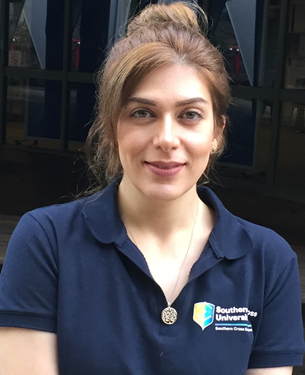Lecture series in Ecology and Environmental Research SS 2021
Dr. Niloofar Karimian
Faculty of Science and Engineering Southern Cross University, Lismore, Australia (Homepage)
Thursday, 06.05.2021 12:15-13:45,
Consequences of climate-induced redox oscillations on iron, sulfur, and contaminant geochemistry in freshwater re-flooded acid sulfate soil wetlands
Consequences of climate-induced redox oscillations on iron, sulfur, and contaminant geochemistry in freshwater re-flooded acid sulfate soil wetlands.
|
Dr. Niloofar Karimian Faculty of Science and Engineering Southern Cross University, Lismore, Australia |
 |
A complex interplay between hydrology, redox conditions and iron (Fe) and sulfur (S) mineralogy leads to diverse reactions that determine the geochemical behaviour of contaminants and water quality in acid sulfate soil (ASS) wetlands. Acid sulfate soils are soils and sediments containing elevated concentrations of Fe sulfides or reaction products resulting from oxidation of these sulfidic materials (e.g. acidity and secondary Fe(III)-containing minerals). Many of the iron minerals that commonly occur in ASS environments are both metastable and capable of being potent scavengers for toxic trace metals and metalloids under oxidising acidic conditions. Some trace metals and metalloids (such as arsenic (As) and antimony (Sb)) may have a large impact on environmental quality. Therefore, a sound understanding of metastable host-mineral phases and the corresponding behaviour of associated trace metal/metalloid contaminants under fluctuating redox conditions is essential for ASS wetlands management.
This talk will present some novel aspects of the geochemical cycling of Fe, S and trace metal/metalloids (with the specific focus on As and Sb) in freshwater re-flooded ASS wetlands using a wide range of advanced analytical techniques including X-ray absorption spectroscopy (XAS). A major focus will be made on improving our understanding of the potential effects of seasonal redox oscillations on Fe and S mineralogy in these wetlands and exploring the consequences for mobility and speciation of As and Sb. There is a need for improved interpretation of the important processes and pathways, which are likely to occur in conditions relevant to ASS environmental settings under fluctuating redox conditions in order to better predict prospective environmental outcomes and choose optimal management strategies.
The BayCEER Colloquium serves as an interdisciplinary platform for students, academics and interested citizens: during the lecture period, guests and members of BayCEER give insights into their research, which can then be discussed in plenary and in a relaxed atmosphere during the post-colloquium.
- Programme Colloquium Summer 2025 (PDF)
- Mailing list subscription
- Guide for Speakers
- Guide for Hosts (PDF)
- Scheduling upcoming semester and lecture archive BayCEER Kolloquium

